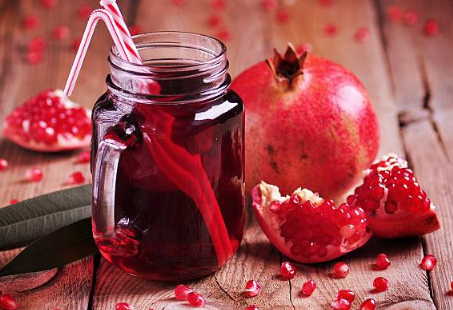You’ve likely heard of pomegranate juice—its jewel-toned color and tangy flavor make it stand out. Like other bright red juices, such as cranberry and tart cherry, pomegranate juice is rich in plant compounds.
While sipping pomegranate juice won’t guarantee you avoid the doctor, drinking it in moderation can be a healthy addition to your daily routine. Here’s what science says about its key benefits—and how it compares to other fruit juices.
What Is Pomegranate Juice?
Pomegranate juice is a sweet, slightly tart beverage made by pressing pomegranates—fruits packed with hundreds of edible seeds called arils.
Most juice comes from pressing the seeds, though some brands use the whole fruit (including peel and membranes) to maximize the polyphenol content for added antioxidant power.
Drinking pomegranate juice offers a convenient way to get the nutrition of the whole fruit—though it lacks dietary fiber. Still, don’t let the fiber content stop you from enjoying this vibrant drink; whether you eat the fruit or drink the juice, you’re still getting impressive nutrients.
That said, pomegranate juice tends to contain more sugar and calories than juices like cranberry or tart cherry. Some brands also add sugar to offset the tartness, which may reduce the overall health benefit.

Health Benefits of Pomegranate Juice
Compounds in pomegranate juice may offer several science-backed health perks—though some evidence is still emerging.
1. It Contains Prebiotics That Support Gut Health
Although it doesn’t have fiber, pomegranate juice may still benefit your gut. It might work as a prebiotic—a type of compound that feeds beneficial gut bacteria.
One lab study showed that compounds in pomegranate juice, especially ellagic acid, may support the growth of probiotic bacteria like Bifidobacterium and Lactobacillus.
However, these findings are from test-tube studies, so more human research is needed before we can say how pomegranate juice truly affects the gut microbiome.
It also appears to have antimicrobial properties. Compounds in the juice may help inhibit H. pylori, a bacteria linked to stomach ulcers and some stomach cancers—but again, more research is needed to confirm any cancer-prevention link.
2. It Might Support Heart Health—Though More Research Is Needed
Rich in polyphenols and potassium, pomegranate juice has strong antioxidant effects and may be a good addition to a heart-healthy diet.
Polyphenols like punicalagin help reduce arterial plaque buildup, while potassium may help lower blood pressure. In fact, a meta-analysis found that drinking pomegranate juice significantly lowered both systolic and diastolic blood pressure.
Another small study found that eight weeks of daily pomegranate juice helped reduce triglycerides, raise HDL cholesterol, and decrease oxidative stress and inflammation—but this was in people undergoing dialysis, so results may not apply to everyone.
Overall, eating a diet rich in fruits and vegetables—including pomegranates—is proven to benefit heart health.
3. It May Help Promote Kidney Health
Kidney stones form when minerals and salts crystallize in the kidneys. They’re painful to pass—and may be prevented with a fruit- and veggie-rich diet.
Some evidence suggests that pomegranate juice may help reduce calcium-based stone formation in healthy individuals. However, those with kidney disease who must limit potassium intake should speak to a healthcare provider before drinking it regularly.
4. It Might Boost Exercise Performance
If you’re active, pomegranate juice may help you power through your workouts—thanks to its polyphenol antioxidants. Early research shows these compounds may improve blood vessel dilation, enhancing blood flow to muscles.
One small study found that athletes who drank around 16 ounces of pomegranate juice daily for two weeks retained more arm strength post-exercise than those who didn’t.
Another study noted improved performance and faster recovery after intense workouts with pomegranate juice.
5. It May Help Protect Skin Structure and Appearance
Emerging research suggests that whole pomegranate extracts may enhance skin’s resilience to UV exposure and help repair sun damage. One placebo-controlled clinical trial found that daily pomegranate consumption helped reduce sun-induced pigmentation.
Easy Ways to Add Pomegranate Juice to Your Routine
Incorporating pomegranate juice into your daily life is easy and tasty. Try these ideas:
-
Morning Sip: Start your day with a glass of chilled pomegranate juice for an antioxidant-rich hydration boost.
-
Smoothie Booster: Blend it into post-workout smoothies or protein shakes for added nutrients.
-
Sparkling Mixer: Combine with sparkling water for a refreshing midday mocktail.
-
Flavorful Marinade: Use it as a base for marinades or salad dressings to add depth and tang.
-
Try the Extract: Pomegranate extract, made from dried and powdered fruit, can be added to smoothies or supplements.
-
Go Powdered: Pomegranate juice powder can be stirred into water, mixed into tea, blended into smoothies, or sprinkled on yogurt or salads.
